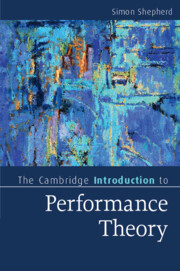Book contents
- Frontmatter
- Contents
- Preface
- Part I Definitions of performance
- Part II The emergence of performance as sensuous practice
- Part III Theorising performance
- 15 Performance, postmodernism and critical theory
- 16 What Performance Studies is: version 1: New York and Northwestern
- 17 What Performance Studies is: version 2: Oral interpretation
- 18 How Performance Studies emerged
- 19 Gender performativity
- 20 Performance and performativity
- 21 The relations between performance, theatre and text
- 22 The magic of performance
- Closing note
- References
- Index
- Cambridge Introductions to …
20 - Performance and performativity
from Part III - Theorising performance
Published online by Cambridge University Press: 05 February 2016
- Frontmatter
- Contents
- Preface
- Part I Definitions of performance
- Part II The emergence of performance as sensuous practice
- Part III Theorising performance
- 15 Performance, postmodernism and critical theory
- 16 What Performance Studies is: version 1: New York and Northwestern
- 17 What Performance Studies is: version 2: Oral interpretation
- 18 How Performance Studies emerged
- 19 Gender performativity
- 20 Performance and performativity
- 21 The relations between performance, theatre and text
- 22 The magic of performance
- Closing note
- References
- Index
- Cambridge Introductions to …
Summary
The process of shaking free can be seen at work in, for example, Elin Diamond's Performance and Cultural Politics. Diamond's introduction to this collection of essays is a commendable intervention in two respects. First, by connecting performance analysis to cultural commentary, she seeks to expand its range of usefulness and social effect. Second, she highlights the embattled position of US cultural studies and, by linking the disciplines, brings the power of the growing one to the assistance of the weaker. To argue the case for the link between them she reviews the relationship of performance and performativity. This review is almost obligatory since, as she wittily remarks, ‘performance discourse and its new theoretical partner, “performativity”, are dominating critical discussion almost to the point of stupefaction’. The performativity she describes is less Austin's than Derrida's, where ‘the “I” has no interior secure ego or core identity.’ But at the same time there is a need to counterbalance the shift in emphasis in Butler's notion of performativity that resulted from her correction of the misreadings of Gender Trouble. As Diamond sees it, in Bodies ‘performativity moves closer to Derridean citationality, operating within a matrix of discursive norms and further from deliberate performances that enact those norms in particular sites with particular effects.’ This critique of the more Derridean performativity is necessary if one wants to maintain the claim that performance can have social efficacy: ‘in the sense that I do my performance in public, for spectators who are interpreting and/or performing with me, there are real effects, meanings solicited or imposed that produce relations in the real. Can performance make a difference?’ (1996: 2, 5).
Driven by a perfectly understandable desire to retain material efficacy for performance, as something that can actually make a difference in the world, Diamond offers a rethinking of the model of performativity outlined in Bodies:
Performance, as I have tried to suggest, is precisely the site in which concealed or dissimulated conventions might be investigated. Where performativity materializes as performance in that risky and dangerous negotiation between a doing … and a thing done … between someone's body and the conventions of embodiment, we have access to cultural meanings and critique. Performativity, I would suggest, must be rooted in the materiality and historical density of performance. (1996: 5; my elision)
The notion of a performativity that ‘materializes as performance’ or, in her earlier phrase, …
- Type
- Chapter
- Information
- The Cambridge Introduction to Performance Theory , pp. 190 - 198Publisher: Cambridge University PressPrint publication year: 2016



